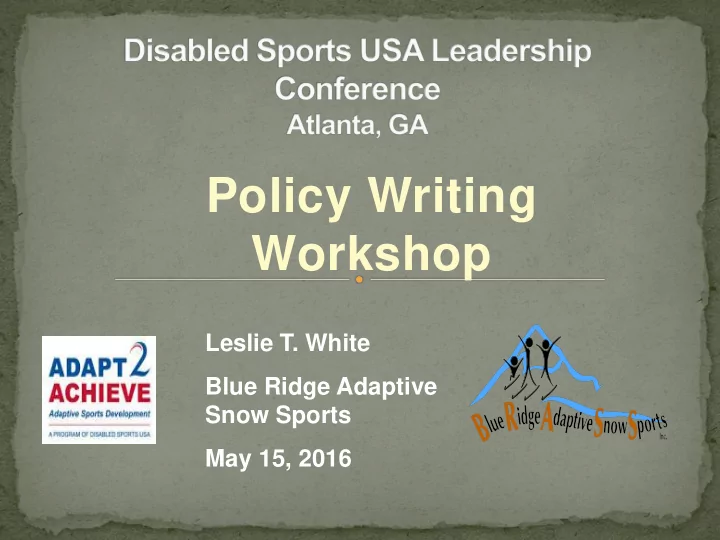

Policy Writing Workshop Leslie T. White Blue Ridge Adaptive Snow Sports May 15, 2016
To explore benefits & concerns of policies & procedures To define terms To learn how to write effective policies & procedures To develop plan for implementation and review process
Consistency Transparency Accountability Quality Management
If none exist . . . Unwritten practices become informal policies Someone else is setting the standard Inconsistency Inefficiency
When done badly . . . Not enforced Enforced inconsistently Unenforceable
Increased liability exposure Decreased efficiency and efficacy Violations of laws or regulations Uncontrolled costs
Guidelines, intentions and plans for WHAT an organization proposes to do. Implies choices - defining one action as appropriate while another is not. A Guide for the Development of Policies and Procedures in Ontario’s Community Literacy Agencies, Volume Two , Fiona Huebner, Community Literacy of Ontario, 2000.
WHAT organization intends to do Strategic – developed relative to vision, mission and strategic objectives Principle, guideline or rule to guide decision & achieve desired outcomes Key determinants of quality – what really drives quality
Identify Need State Goal or Purpose Gather Information Develop & Write
Review Obtain Management Approval Legal Review (If Needed) Board Approval (If Needed) Implementation
Identify key determinants of quality Confidentiality Health & Safety (or security) Decision making Equitable practices Responsible, accountable management Duty of care Clients/participants Staff Service standards What really drives quality in your services & organization?
HOW are you going to do things! Outline of steps for HOW the organization’s wishes and intentions (policies) are to be carried out
Guideline Suggested way of doing something. No sanctions if not followed Rule A principle or regulation governing conduct, actions, procedures, arrangements, etc. A prescribed guide for conduct or action (acceptable behavior) Sanctions if not followed Standard Any definite rule, principle or measure established by authority, custom, or general consent. Has liability implications
For each policy identify procedures, guidelines, rules or standards needed Best practices What do other nonprofits do? Governmental requirements, regulations, rules Strategic plan, vision, mission, values, philosophy, & culture Volunteers, employees, board, clients, donors and any other stakeholders
Gather information – internal & external Define purpose or function of procedure Review alternatives & options for how to do the procedure Assess all possible impacts of policy/procedure (unintended consequences)
Target audience – who it applies to Who is responsible for the procedure Who must approve Time frame & deadlines for procedure Effective date Consequences for non-compliance How & who can make exceptions How to monitor effectiveness
Header 1. Purpose 2. Scope 3. Prerequisites 4. Responsibilities 5. Procedure 6. References 7. Definitions
Do we have the resolve & resources to follow this policy? Is the policy: Logical Practical Intuitive Is it understandable? Is it efficient?
Know your audience - management, employees, volunteers, clients, etc. Reflect management style & culture Why & when will user likely this need information
Write in clear, concise, simple language Avoid jargon & overly technical descriptions Be consistent - Use same words throughout If use acronym spell it out the 1 st time Don’t include information that will be quickly outdated (names, fees, etc.) Say what you mean, mean what you say
Properly define time period Calendar - Define day (calendar, workday) Lists - Is list inclusive or “includes but not limited to ”?
Can - To know how to; to be able to May - A possibility, opportunity or permission Shall - Imperative, implies a command, must Will - Future action; going to
Distribution system Need for employee/volunteer acknowledgement Orientation and training programs Managers & supervisors Other personnel Monitoring techniques
Establish techniques for monitoring Establish standards & results Compare actual to expected results Revise when: Circumstances change Actual results deviate significantly from expected results Plan to implement revisions
Leslie T. White 410-544-0913 Email: Lwhite@croydonconsult.com
Recommend
More recommend